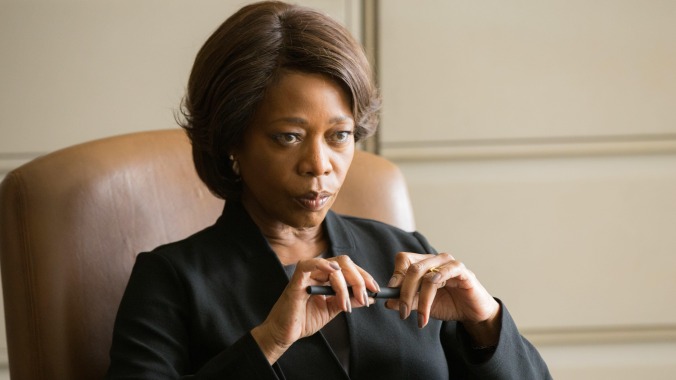Woodard stars as prison warden Bernadine Williams, who attends to her responsibilities with utmost seriousness and severity. Her outfits are crisply tailored suits in somber shades of black and navy blue; her manner with her employees is direct and professional; she never makes any exceptions for defense attorneys, family members, or other visitors. When a man on the lethal injection table begins to pray after she asks for his final statement, she moves the microphone away; when a coworker asks about allowing media in the prison, her answer is a definitive no. A sweeping shot from cinematographer Eric Branco establishes the panopticon of the prison, from its observation tower to its high fences of barbed wire. Bernadine is undoubtedly its master.
Behind its bars is Anthony Woods (Aldis Hodge), a prisoner whose sentence is protested every day by chanting crowds in the parking lot, insisting that Woods is innocent of the crime for which he was convicted, the killing of a police officer. Bernadine passes them every day on her way into work—they occupy her last glimpse of sunny brightness before entering a space of bland greens, dingy taupes, and harsh fluorescent lighting. But she doesn’t waver in her disinterested, distant treatment of Woods, whose execution approaches. “I have to maintain order and safety in this prison,” she repeats, but Woods’ defense lawyer, Marty Lumetta (Richard Schiff), is unsympathetic to her declaration that she’s only doing her job. Marty is convinced that another man is responsible for the murder, and the film peppers in broadcast news reports and radio-show interviews to communicate his work on the case.
Away from the prison, Bernadine’s unyielding facade begins to slip. Sleeping means nightmares, so she sneaks away from nearly estranged husband Jonathan (Wendell Pierce) to spend nights on the couch. At a bar near work, she orders so many drinks that the deputy warden (Richard Gunn) has to drive her home. And as her colleagues announce their plans to retire and to finally leave this line of work behind, Bernadine grapples with the realization that her success at the job might not necessarily be a good thing—that there might be a limit to how complicit she can be in so much death.
Chukwu captures the routines prisons rely on to diminish the humanity of the incarcerated, even as her script allows the prison staff to reconsider their roles in maintaining this system of power and control. In a brief window of time outside, Woods bounces a basketball in a circle; Branco follows him in a spinning 360-degree shot as tight as the cage in which Woods is allowed to exercise. A meeting where Bernadine decides which staff members should work the next execution is drably filmed, mirroring how Bernadine speaks of Woods’ upcoming execution with the man. She says words like “option” and “choice” while talking to Woods in his cell, and Hodge’s performance during that scene—increasingly panicked, unable to meet Bernadine’s gaze, eventually dissolving into tears—is deeply upsetting. Both actors are excellent, playing characters who begin to share an inner turmoil as the film progresses.
When Jonathan reads excerpts from Ralph Ellison’s Invisible Man to his high school students, Chukwu centers their faces directly in the middle of the frame, just as she often does with Hodge’s, underscoring the humanity of both. The inclusion of “I am invisible, understand, simply because people refuse to see me” is slightly on the nose, but it aligns with the film’s extension of interiority to all its characters; there are no flatly racist prison guards here, no one single person who the film presents as the problem. The criticism put forth by Clemency is broader than that, and the strong performances of the ensemble support Chukwu’s unsettling examination into the many ways the criminal justice system implicates, shames, and corrupts those ensnared by it, regardless of whether they’re inside or outside the bars.


 Keep scrolling for more great stories.
Keep scrolling for more great stories.
